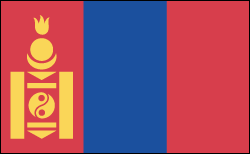Mongolia News & Current Events


Mongolian Democratic Revolution
In 1989, the Mongolian democratic revolution began, led by Sanjaasurengiyn Zorig. Free elections held in Aug. 1990 produced a multiparty government, though it was still largely Communist. As a result, Mongolia has moved only gradually toward a market economy. With the collapse of the USSR, however, Mongolia was deprived of Soviet aid. Primarily in reaction to the economic turmoil, the Communist Mongolian People's Revolutionary Party (MPRP) won a significant majority in parliamentary elections in 1992. In 1996, however, the Democratic Alliance, an electoral coalition, defeated the MPRP, breaking with Communist rule for the first time since 1921. But in 1997, a former Communist and chairman of the People's Revolutionary Party, Natsagiyn Bagabandi, was elected president, further strengthening the hand of the antireformers. Then, in 1998, Tsakhiagiin Elbegdorj, a pro-reform politician, became prime minister, but parliamentary cross-purposes led to his resignation, and a succession of prime ministers followed.
In 2005, Nambaryn Enkhbayar of the former Communist party MPRP became president, and Miyeegombo Enkhbold, also of the MPRP, was elected prime minister in 2006. Enkhbold resigned in Nov. 2007 after the MPRP ousted him as chairman of the party, citing his weakness as a leader. Sanj Bayar succeeded Enkhbold as both party chairman and prime minister.
Unprecedented violence and rioting followed June 2008's parliamentary elections, prompting the government to declare a state of emergency. Five people were killed, hundreds were injured, and more than 700 people were detained. Preliminary results gave 45 seats to the governing MPRP and 28 seats to the opposition Democratic Party. International observers did not report any irregularities in the voting, but the Democratic Party accused the MPRP of fraud. Meanwhile, Mongolia continues to be plagued by poor economic growth, corruption, and inflation.
In presidential elections, former prime minister, Tsakhiagiyn Elbegdorj (opposition Democratic Party), defeated incumbent Nambaryn Enkhbayar Won (MPRP) in a 51% to 47% victory. Elbegdorj took office in June 2009. Prime Minister Bayar resigned in October 2009, citing health reasons. He was succeeded by Foreign Minister Sukhbaataryn Batbold.
Mongolia's Economy Grows and So Does Worry Over China
In recent years, Mongolia has shown signs of economic growth. In February 2011, Citigroup placed Mongolia on its list of Global Growth Generators, one of the countries with the most promising growth prospects from 2010—2050. Also in 2011, the Mongolian Stock Exchange, had a total market capitalization of $2 billion (in U.S. dollars), quadrupling from $406 million in 2008.
However, Mongolia continued to be vulnerable to China's near monopoly over the country's exports and was still forced to take 30 percent less than their goods would be worth on the open market. In April 2012, news broke that Ivanhoe Mines of Canada was going to sell its majority share of a Mongolian coal mine to a Chinese state-owned aluminum manufacturer. The announcement forced Parliament to pass long-standing legislation prohibiting foreign enterprises from purchasing a majority of the country's industries without approval from the government. To balance its reliance on China, Mongolia has reached out to the United States, sending its troops to Afghanistan, Iraq and Alaska where they train with the National Guard.
In June 2012, President Elbegdorj was honored as a Champion of the Earth for his commitment to environmental protection. The award came from the United Nations Environmental Programme. In July 2012, U.S. Secretary of State Hillary Rodham Clinton visited Mongolia and commended Elbegdorj on his efforts to end corruption and on the country's democratic progress. In August 2012, Norov Altankhuyag assumed office as the country's new prime minister.
Elbegdorj Wins Reelection in 2013
On June 26, 2013, Tsakhiagiin Elbegdorj was reelected president. He received 50.23% of the vote. Badmaanyambuugiin Bat-Erdene, the Mongolian People's Party candidate, came in second with 41.97% of the vote. Elbegdorj was inaugurated for a second term on July 10, 2013.
The day after Elbegdorj's reelection, President Obama released this statement: "President Elbegdorj has been an important leader in advancing democracy and freedom in his country and a key partner for the United States in Asia and globally. Through its impressive democratic achievements and its progress on economic liberalization, Mongolia serves as a significant example of positive reform and transformation for peoples around the world."
In Nov. 2014, Prime Minister Norov Altankhuyag was ousted by parliament in a no-confidence vote of 36-30. Parliament elected Chimediin Saikhanbileg as the new prime minister later that month, by a vote of 42-2. Thirty-two members of parliament were not present at the time of the Saikhanbileg vote. A member of the Democratic Party, Saikhanbileg has previously served as leader of the Democratic caucus in parliament.
See also Encyclopedia: Mongolia .
U.S. State Dept. Country Notes: Mongolia







